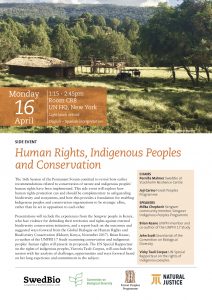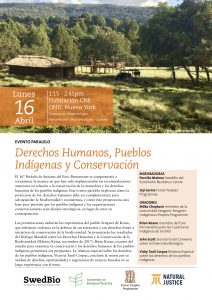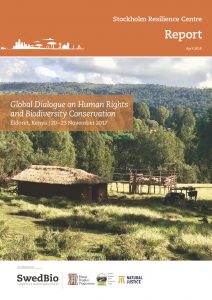 Story highlights
Story highlights
- Protecting the rights of people who live on their ancestral lands and nurture local biodiversity is often the most strategic and effective means available to conserve and sustainably manage biodiversity and ecosystems
- Human Rights, biodiversity and natural resource conservation can mutually support one another, for the attainment of the Sustainable Development Goals
- Respect and recognition of the value of Indigenous knowledge is a step towards recognition of the rights of Indigenous peoples over resources and territories
Throughout the history of humanity, biological and cultural diversity have been inextricably connected. Protecting the rights of people who depend on direct and long-standing relationships with their ancestral territories is a requirement of international human rights law. It is also often the most strategic and effective means to conserve and sustainably manage biodiversity and ecosystems.
Advancing the synergies between Human Rights and Conservation
The Global Dialogue on Human Rights and Biodiversity Conservation, took place in Eldoret, Kenya in November 2017. It held as starting point the conviction that local people and conservation organisations can be strategic allies. While the dialogue was designed in a global policy-setting context it also aimed to contribute to local solutions, and was attended by conservation agencies, social justice and human rights advocates, biodiversity conservation and sustainable use experts, legal and human rights professionals, members of community-based organisations, government officials, UN-organisations, and academics.
The global dialogue emerged from the call of Indigenous peoples’ organizations around the world facing repeated challenges of forced evictions from their ancestral territories in the name of conservation. The UN Special Rapporteur on human rights and the environment, and the UN Special Rapporteur on the rights of indigenous peoples, repeatedly brought up these issues in their reports, underlining that human rights and biodiversity conservation can and should be mutually reinforcing and not put in opposition. Co-conveners were SwedBio, Forest Peoples Programme and Natural Justice, with the Chepkitale Indigenous Peoples Development Project as the local host.
Throughout the history of humanity, biological and cultural diversity have been inextricably connected. Protecting the rights of people who depend on their direct and long-standing relationships with their ancestral territories is a requirement of international human rights law. It is also often the most strategic and effective mean available to conserve and sustainably manage biodiversity and ecosystems Pernilla Malmer, Senior Adviser, SwedBio
A synergetic discourse in several international fora
Over time, the Permanent Forum has given a number of recommendations related to human rights and conservation, urging governments and conservation agencies to recognize and respect Indigenous peoples when establishing and managing protected areas affecting Indigenous territories, livelihoods and resources. However, the 16th Session of the UNPFII noted these recommendations remain largely unimplemented. In the same spirit, in 2016 the UN Special Rapporteur on the rights of indigenous peoples, Victoria Tauli-Corpuz, presented her thematic report on conservation and the rights of Indigenous peoples, which contributed to the UNPFII 16 commitment to examine recent developments related to conservation of nature and indigenous peoples’ human rights.
The Convention on Biological Diversity, signed by 196 countries, recognises the crucial importance of traditional knowledge of Indigenous peoples and local communities to the achievement of the goals of the Convention and its Protocols, particularly in its article 8(j) and 10(c). Many Indigenous peoples’ organizations, and their supporting NGOs have been working on human rights, biodiversity and natural resource conservation, as indispensable elements that mutually support one another, for the attainment of the Sustainable Development Goals.
The Intergovernmental Science Policy Platform on Biodiversity and Ecosystem Services (IPBES) is also exploring tools and methods to ensure equity across indigenous, local and scientific knowledge systems. The IPBES includes indigenous and local knowledge in all its assessments on the state of biodiversity and ecosystem services, at an equal level to science. The 16th UNPFII session supported the Platform’s approach to recognizing indigenous knowledge and practices.
Bringing the dialogue forward at the 17th session of the Permanent Forum
Participants to the 17th session of the Permanent Forum, are welcome to the side event Human Rights, Indigenous Peoples and Conservation on Monday 16 April, 1:15 – 2:30pm, Room CR 8, United Nations Headquarters. SwedBio is convening the event with the Secretariat of the Convention on Biological Diversity, Forest Peoples Programme, and Natural Justice. The aim is to promote dialogue on how human rights protection can and should be complementary to safeguarding biodiversity and ecosystems, providing a foundation for enabling indigenous peoples and conservation organisations to be strategic allies, rather than being in opposition.
The workshop report from the Global Dialogue on Human Rights and Biodiversity Conservation will also be launched at the event. The report discusses approaches, tools, and practices that can enable the mutual promotion of human rights and conservation targets.

 FLYER: Side event "Human Rights, Indigenous Peoples and Conservation" Monday 16 April, 1:15 – 2:30pm, Room CR 8, UN HQ
FLYER: Side event "Human Rights, Indigenous Peoples and Conservation" Monday 16 April, 1:15 – 2:30pm, Room CR 8, UN HQ FOLLETO: Evento paralelo "Derechos Humanos, Pueblos Indígenas y Conservación" Lunes 16 Abril, 1:15 – 2:30pm, Habitación CR8, Sede ONU
FOLLETO: Evento paralelo "Derechos Humanos, Pueblos Indígenas y Conservación" Lunes 16 Abril, 1:15 – 2:30pm, Habitación CR8, Sede ONU REPORT: Global Dialogue on Human Rights and Biodiversity Conservation
REPORT: Global Dialogue on Human Rights and Biodiversity Conservation Pernilla Malmer
Pernilla Malmer